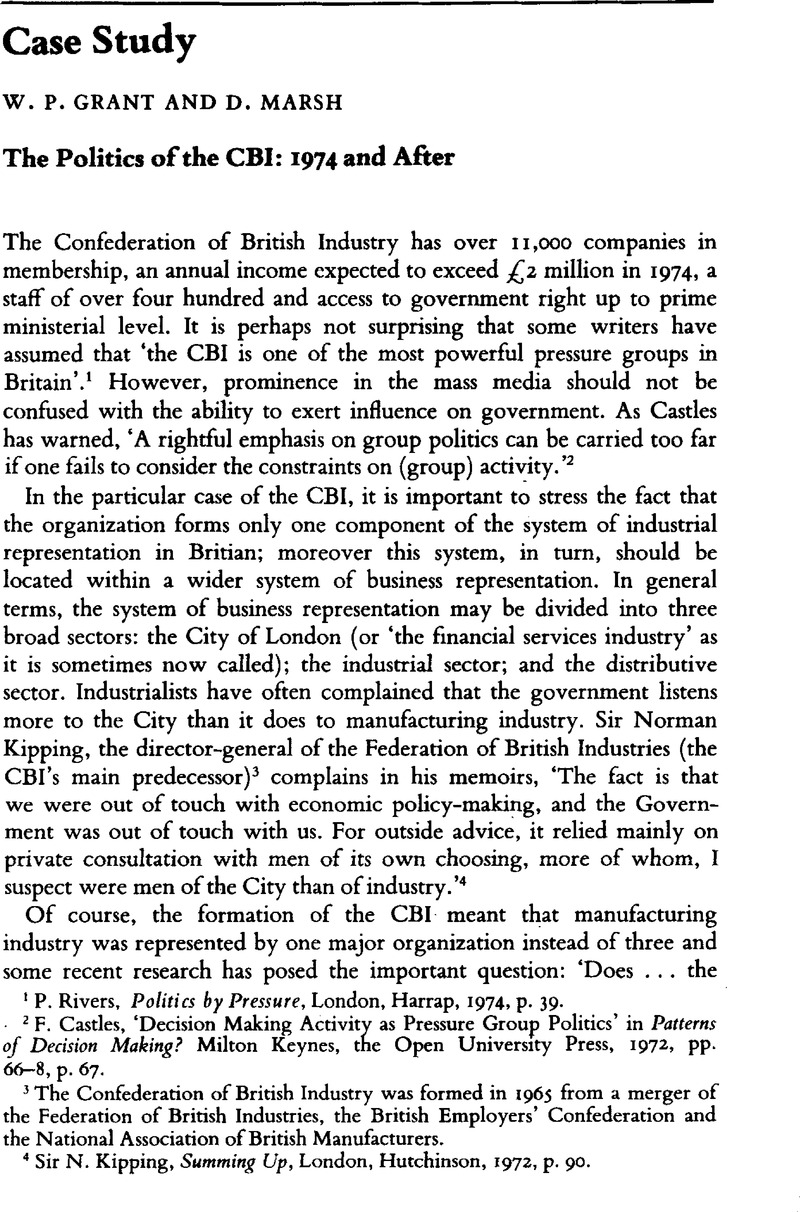Article contents
The Politics of the CBI: 1974 and After
Published online by Cambridge University Press: 28 March 2014
Abstract

- Type
- Case Study
- Information
- Copyright
- Copyright © Government and Opposition Ltd 1975
References
1 Rivers, P., Politics by Pressure, London, Harrap, 1974, p. 39.Google Scholar
2 Castles, F., ‘Decision Making Activity as Pressure Group Polities’ in Patterns of Decision Making? Milton Keynes, the Open University Press, 1972, pp. 66–8, p. 67.Google Scholar
3 The Confederation of British Industry was formed in 1965 from a merger of the Federation of British Industries, the British Employers’ Confederation and the National Association of British Manufacturers.
4 SirKipping, N., Summing Up, London, Hutchinson, 1972, p. 90.Google Scholar
5 Whitley, R., ‘The City and Industry’ in Stanworth, P. and Giddens, A. (eds), Elites and Power in British Society, London, Cambridge University Press, 1974, pp. 65–80,Google Scholar p. 80.
6 Report of the Commission of Inquiry into Industrial and Commercial Representation (Devlin Report), London, Association of British Chambers of Commerce and Confederation of British Industry, 1972. For an analysis of the report see Grant, W. P. and Marsh, D., ‘Government and Industry: a New Pattern of Representation?’, Public Administration Bulletin, 14, pp. 10–20.Google Scholar
7 We are grateful to the Confederation of British Industry for supplying the figures presented in this and other tables in our article. Any errors are the responsibility of the authors.
8 At present (September 1974): the Multiple Shops Federation, the Retail Distributors Association, the National Chamber of Trade, the Cooperative Union, the Retail Alliance, the Mail Order Traders Association and the Scottish Retail Federation. For a more detailed analysis of retail representation in Britain see: Grant, W. P. and Marsh, D., ‘The Representation ofRetail Interests in Britain’, Political Studies, Vol. 12, pp. 168–77.Google Scholar
9 The Times, 7 March 1974.
10 Devlin Report, op. cit., p. 59.
11 Ibid., p. 74.
12 CBI Services, London, Confederation of British Industry, 1972.
13 For a more detailed analysis of this problem see Grant, W. P., ‘British Employers’ Associations and the Enlarged Community’, Journal of Common Market Studies, Vol. 11, pp. 276–86.CrossRefGoogle Scholar
14 Your Company and the CBI, London, Confederation of British Industry, 1972, p. 5.
15 Devlin Report, op. cit., p. 11.
16 CBI Annual Report, 1972, p. 13.
17 See, for example, Wigham, E., The Power to Manage: a History of the Engineering Employers’ Federation, Macmillan, London, 1973, p. 234.CrossRefGoogle Scholar
18 CBI Annual Report, 1965, p. 7.
19 See Public Enterprise, No. 1, Public Enterprise Group, London, 1972, p. 1.
20 In Sweden the congress of the Social Democratic Party in 1969 decided that state‐owned companies should leave Svenska Arbetsgivareföreningen, the Swedish equivalent of the CBI. However, ‘there exists today a certain cooperation between the new employers’ associations for companies owned by the state and SAF‘. (Personal communication from Curt‐Steffan Giesecke, SAP, Stockholm, 19 May 1974). In Italy, the major state employers’ organization, Associazione Sindacale Intersind seems to have developed a more independent line. See W. Kendall, ‘Labour Relations’ in Holland, S. (ed.), The State as Entrepreneur, London, Weidenfeld & Nicolson, 1972, pp. 219–33,Google Scholar especially pp. 222–6.
21 Britain’s Small Firms: Their Vital Role in the Economy, London, Confederation of British Industry, 1972, p. 2.
22 CBI Annual Report, 1972, p. 26.
23 Report of the Committee of Inquiry on Small Firms (Bolton), Cmnd. 4811, p. 33.
24 These serve Scotland, Wales, Northern Ireland and nine English regions.
25 Devlin Report, op. cit., p. 12.
26 CBI Annual Report, 1973, p. 26.
27 Powell, E., ‘Capitalist Spokesmen and Socialist Government’, The Director, 02 1965, pp. 244–7,Google Scholar p. 247.
28 Economic Growth, Profits and Investment, London, Industrial Policy Group, 1972.
29 CBI Annual Report, 1965, p. 3.
30 From transcripts supplied by the CBI.
31 Birmingham Post, 28 February 1974.
32 Ibid.
33 Nettl, J. P., ‘Consensus or Elite Domination: the Case of Business’, Political Studies, Vol. 13, pp. 22–44,Google Scholar P.22.
34 Letter from Ralph Bateman to CBI members, 31 May 1974, p. 3.
35 Ibid.
36 Blank, S., Industry and Government in Britain, Farnborough, Saxon House, 1973, p. 51.Google Scholar
37 W. P. Grant and D. Marsh, The Confederation of British Industry, to be published by Hodder & Stoughton.
- 4
- Cited by




